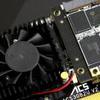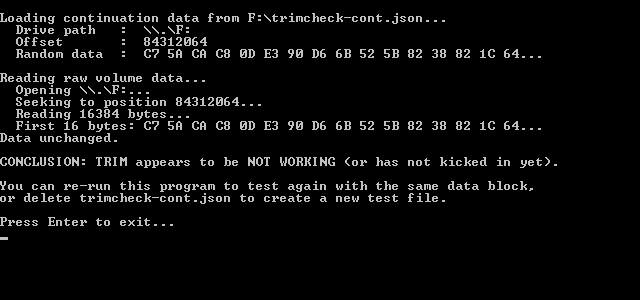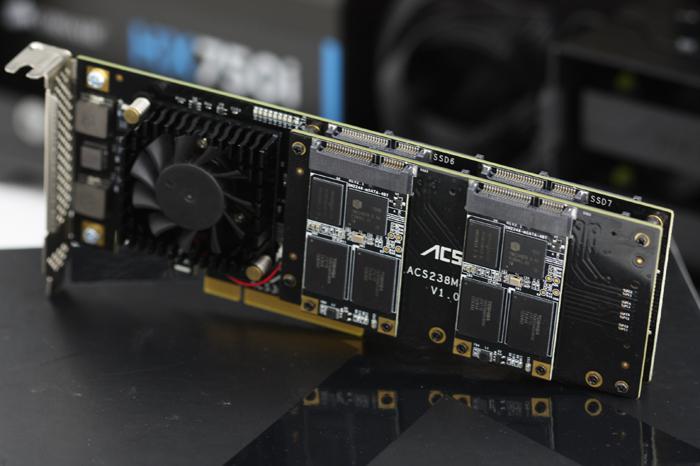Final Words & Conclusion
Final Words & Conclusion
It is rare to see a product as fast as tested today, but with all new technologies it is slowly becoming more common to see. As such I do believe that RAID solution based storage will exit the consumer market and only will remain to be an enterprise solution. Situations where you need massive workloads and RAW brutal performance. You have been able to see that this storage unit manages to shock and awe, and then in specific trace situations with random 4k loads, the unit unfortunately slows down badly under the performance level of any modern age SSD. Realistically the peak perf numbers you have seen only have been possible by RAID solutions, but the product is very fast in this default configuration and the right circumstances.
I do want to make a side-note about a problem we noticed, TRIM does not seem to function. I cannot imagine this LSI controller not supporting it. So I do hope to see that enabled with a future driver or firmware update.
Performance
The A-Spec / KingSpec P2U38-2T (2TB) edition PCIe SSD performs close to advertised, it can reach astonishing numbers close to 3500 to 4000 MB/sec. This however always goes for very selected benchmarks with bigger sequential and linear writes and thus specific workloads. Once you pass bigger block files sizes the performance jumps up hard, but low file block sizes are a huge bottleneck for this RAID based array. So the PCI Express storage unit shines at large sequential writes. Interestingly 4K aligned random IOPs performance was overall very good as well, though our write tests showed below par performance in software like AS SSD and Anvil on the 4K (really tiny files) test loads.
Simply put, this PCIE Storage array is fast in large files and relatively slow in small files. The performance with say 4KB and even 512KB files is tied towards the fact that the RAID unit is not cached. That does pose a performance issue. KingSpec will issue a PCIE card that will offer extremely high performance in 4KB files next year though.
So the one downside of the product is that under massive 4K block size workloads the degradation performance drops down to 'normal' SSD values. For everyday PC usage however you are clear as the workload in a consumer environment is simply not that daunting for today's SSDs. Can you imagine moving around your 10GB 1080P movies at 3 to 4GB per second :) That's where the power of this unit need to be found.
Concluding
This was a review on a product that you as a consumer will have a hard time finding. That said, isn't it fun to read a review that is taken out the regular context with the regular names like intel, Samsung, Toshiba etc ? With this article we give a smaller company in the market a chance for some content coverage. We should probably do that more often. Alright, let me wrap things up. This 2 TB PCI-Express 3.0 compatible storage unit is very unique in its design, with eight 256GB mSATA SSDs and an Avago LSI Fury RAID controller some serious magic does happen. I for one have never ever copied a 37GB ISO file as fast as I did testing for this review. The sheer performance numbers you get thrown at you are impressive. However as shown, under very hefty 4K block-size workloads we see the performance of this unit drop hard. So for the consumer side of things there are two primary negatives, the RAID controller lacks TRIM support and neither is the array fitted with a proper file-cache. As such singe threaded 4K IO for this driver is actually showing lower numbers than most single drive SATA SSDs on the market. The current implementation with the LSI RAID controller as such is a bottleneck for SSD-level small file IO access. Under massive linear and sustained copies you'll however see numbers that will scare the living daylights out of you, it is that fast. As such this is an excellent solution for huge load workstations, say the guys and gals that do things like a lot of video editing or copy around large files like MP3, MKV, AVI and ISOs. The device is bootable, seems reliable and will last you a long time as it is rated at 2 Terabyte writes per day for eight years. While I find that number shockingly high, we did re-confirm this info with them and they really do claim this figure. If you find the looks a bit trivial, hey we did test the enterprise solution on a low profile form factor. The consumer version will be a regular slot filling product with a shield on top of it. One remark for KingSpec / A-Spec, for consumer grade SSDs you guys will need to look into a fan cooler that is a little less noisy. Overall noise from the tiny fan was not bad, but you can hear it at all times. We find the A-Spec / KingSpec P2U38-2T a fascinating product, but at consumer level a revised model with proper small file caching needs to be addressed. This is announced by them and as such we cannot wait to test their next product once it reaches the market.
If interested, be sure to give KingSpec a visit.
Recommended Downloads



